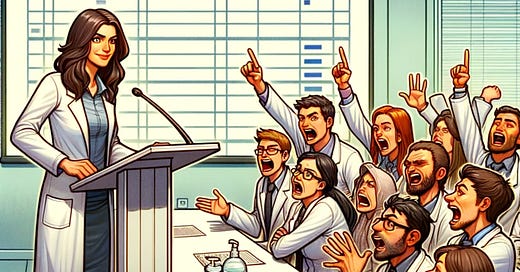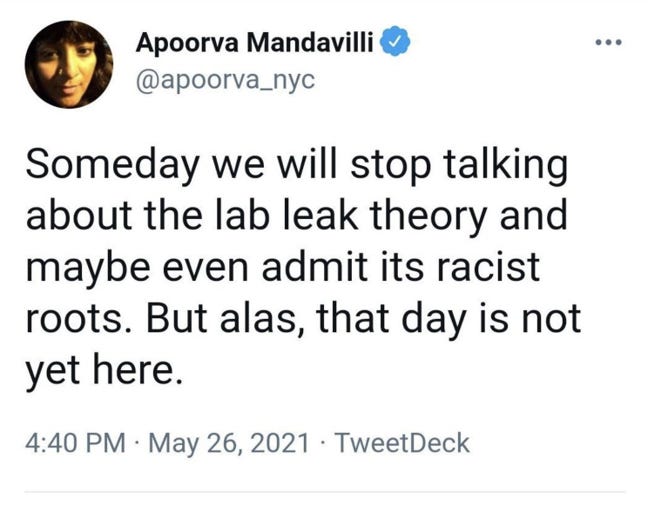The debate over the origins of Covid-19 has really picked up since the publication of Nicholas Wade’s piece on May 2 (look at that Google Trends graph below). With the intensified discussion has also come a phenomenon common across politically contentious areas of science: discourse policing within the media and scientific community.
Specifically, some in the scientific community want the debate to stop and for those calling for a more rigorous assessment of a lab leak possibility to be silenced or ignored. Interestingly, those policing the discourse all come from one side: those who judge a lab leak to be implausible and who argue that Covid-19 almost certainly jumped straight from animals to humans, with no possible stop at a lab in between.
The dynamics of discourse silencing in science follow what is by now a very familiar playbook.
One strategy is to associate your opponent with political figures who are generally unpopular in the scientific community. For example, a commentary today in Nature opened as follows:
Calls to investigate Chinese laboratories have reached a fever pitch in the United States, as Republican leaders allege that the coronavirus causing the pandemic was leaked from one, and as some scientists argue that this ‘lab leak’ hypothesis requires a thorough, independent inquiry. But for many researchers, the tone of the growing demands is unsettling. They say the volatility of the debate could thwart efforts to study the virus’s origins.
The passage explicitly associates scientists calling for an investigation with “Republican leaders” and presents these scientists and Republicans in opposition to “many researchers.” No mention is made here of the fact that President Biden just yesterday joined those “Republican leaders” in calling for an investigation of Covid-19 origins.
It is fairly obvious that in many (even most) areas of research, scholars have an overwhelmingly left-leaning view (hey, I’m one of them), so tarring any scientists as being associated with Republicans (or even worse, Donald Trump) is a not-so-subtle way to signal the unacceptability of their views.
Virologist Dr. Angela Rassmussen went even further with the unsavory associations in a Tweet following on the Nature commentary:


Another strategy of discourse policing is for scientists to claim that the discussion is unhelpful or even harmful to their scientific or political goals. For instance, some scientists expressed to Nature worry that expressions of the possibility of a lab leak might harm the ability to perform research based in China.
[V]irologists suggest that such sentiments could lead to more scrutiny of US grants for research projects conducted in China. They point to a coronavirus project run by a US non-profit organization and the WIV that was abruptly suspended last year after the US National Institutes of Health pulled its funding. Without such collaborations, says [virologist Kevin] Andersen, scientists will have difficulty discovering the source of the pandemic.
Who wants to be responsible for their colleague losing out on a funding or research opportunity? In science omertà means avoiding critique that might hurt favored causes of scientists, and of course more research is always among those favored causes.
There are also political objectives that might be made more difficult to attain in the presence of uncomfortable questions or answers. For instance, David Fidler, a global-health researcher at the Council on Foreign Relations, argues that the larger aims of geopolitics should trump an investigation into Covid-19 origins:
He says that the escalating demands and allegations are contributing to a geopolitical rift at a moment when solidarity is needed. “The United States continues to poke China in the eye on this issue of an investigation,” he says. Even if COVID-19 origin investigations move forward, Fidler doesn’t expect them to reveal the definitive data that scientists seek any time soon.
A third common strategy of discourse policing is to associate legitimate expert claims with completely unrelated statements or perspectives, some of which may be abusive or racist. For instance, the Nature commentary somewhat bizarrely associated a letter in Science by a range of widely respected experts calling for a more intensive investigation of Covid-19 origins with abuse another scientist received on Twitter:
In the Science letter, the authors note that Asian people have been harassed by those who blame COVID-19 on China, and attempt to dissuade abuse. Nonetheless, some aggressive proponents of the lab-leak hypothesis interpreted the letter as supporting their ideas. For instance, a neuroscientist belonging to a group that claims to independently investigate COVID-19 tweeted that the letter is a diluted version of ideas his group posted online last year. That same week on Twitter, the neuroscientist also lashed out at Rasmussen, who has tried to explain studies suggesting a natural origin of SARS-CoV-2 to the public. He called her fat, and then posted a derogatory comment about her sexual anatomy.
In this way, the letter writers are being implicitly blamed for some jerk’s behavior on Twitter. Of course, if scientists had to censor themselves because of jerks on Twitter there’d be no science at all.
Similarly, in a Tweet (later deleted), a New York Times reporter who covers Covid-19 expressed a similar sentiment, explicitly associating anyone who talks about the “lab leak theory” with being a racist:
Both The New York Times and Nature are influential media outlets. When their journalists express that certain areas of debate within the scientific community are not just improper, but racist and politically unhelpful, it can have a chilling effect of the willingness of experts to openly discuss these issues. That, of course, is the point.
As someone who has experienced up close and personal long-standing efforts to silence my work, perhaps the best advice I can give to the would-be silencers is to stop wasting your time — it just doesn’t work. The fact that you are reading this proves that. I have no doubt that those pressing for a fuller investigation of a lab leak possibility are not going to be intimidated or shamed into silence either.
More importantly, both democracy and science are better served by open discussions among experts — especially among experts who disagree. It’s OK, the world not only will survive disagreement, but achieving disagreement is a key to reaching agreement and thus progress in science — that goes for discovering Covid-19 origins and pretty much everything else.
On highly politicized issues, there will always be legitimate science which is inconvenient to someone’s political aim. Tough beans. Science isn’t here to serve your or my agendas. Get used to it.







This is just Trump Derangement Syndrome, media created.
Thanks for being an honest broker.
"Science" IS here to serve agendas, though, and it does. Climate catastrophe advocacy is in full attack mode thanks to the media, as smart business insiders take full advantage of government funds.